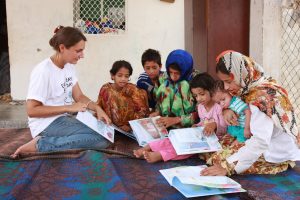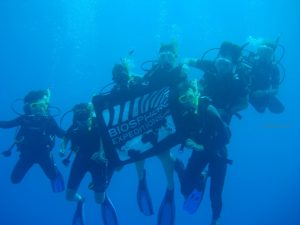 When Dr. Matthias Hammer collected his grant from Ford Motor Company, he vowed to do everything in his power to protect the waters of Musandam. Already, Dr Hammer, Founder & Executive Director of international wildlife conservation organisation Biosphere Expeditions, has amassed a sizeable volume of information, which will help him and his team make their case to the authorities and, he hopes, see a marine protected area declared in Musandam governorate.
When Dr. Matthias Hammer collected his grant from Ford Motor Company, he vowed to do everything in his power to protect the waters of Musandam. Already, Dr Hammer, Founder & Executive Director of international wildlife conservation organisation Biosphere Expeditions, has amassed a sizeable volume of information, which will help him and his team make their case to the authorities and, he hopes, see a marine protected area declared in Musandam governorate.
According to Dr Hammer, this is no small feat given the time, support and money needed to protect the area, which is at risk from overfishing and other threats that disturb the corals and the sea life that inhabit them. “Much needs to be done to persuade decision-makers that this area deserves protected status but, with the help of a US$10,000 grant from Ford, I am confident that Biosphere Expeditions and its partners in the region will be able to do everything possible to make a strong case for Musandam,” says the German biologist.
Creating awareness is among the most important uses this money will be put to. The extra cash will allow the Biosphere Expeditions team to print leaflets that provide information for Musandam residents about the value of marine resources and how to protect them and livelihoods connected to the sea.
In spite of the challenges ahead, Dr Hammer remains a realist. “We biologists say that ‘what pays, stays’,” he says. “Who am I, coming from a European country, to tell a guy down in Musandam to stop fishing because he’ll damage the coral cover? He could have five mouths to feed and fishing might be his only source of income.”
Instead, he explains that, by keeping them in good shape, the reefs will continue to yield produce and, with healthy reefs, the region will also continue to attract diving tourism, which brings money to the local economy. “That way people see that protecting their environment is an investment in their future and that in many ways the land, or in this case the sea, will feed them in more ways than one.”
It was almost by accident that Dr Hammer discovered his new project. In 2003 he was in the mountains of the Musandam peninsula conducting a survey of the endangered Arabian leopard population and decided to take the chance to go diving while he was there. He had no idea just how beautiful the world beneath the Musandam waters would be, and since then he has poured time and resources into protecting the abundant coral cover he was surprised to find there.
“I went for a dive and thought wow, this is really impressive; is anyone doing research here? I did a little investigation myself and discovered that the last survey of this area was conducted in the early seventies, and that was when I decided something really needed to be done,” he recalls.
Since then Biosphere Expeditions, working in conjunction with local and regional partners, such as the Emirates Diving Association based in Dubai, has found that the coral cover is particularly good in the seas around Musandam, especially compared to nearby Dubai, where construction work has left hardly any reefs at all. “The reefs in Musandam are some of the best I have seen in the world. They have withstood the high levels of salinity in the water and, for this region, are in great shape.”
This is the sort of work that Dr Hammer enjoys most. As a biology student at Oxford and later a PhD student at Cambridge University in the UK, he spent some of his time organising conservation expeditions and taking part in mountaineering and climbing trips. Realising that he didn’t want to spend his life as a pure academic, he decided to combine his passions for field biology and business, and harness his entrepreneurial skills by establishing a non-profit organisation that offered people the chance to buy a place on research expeditions. “We meet the needs of those who genuinely want to go beyond just lying on the beach for their holiday, and who want to give something back to the planet instead. We are strictly non-profit and the organisation guarantees that two-thirds of the income we receive from our expedition participants is spent directly on the project in hand.”
 Biosphere Expeditions relies heavily on the resources made available by grants and volunteers. Anyone is eligible to purchase a place on one of Biosphere Expeditions’ projects around the world and take part in the environmental work the non-profit organisation conducts, whether it is tracking Arabian leopards in Oman, photographing whale flukes in the Azores or surveying the coral reefs of Musandam. In this way they gather the manpower to carry out vital projects to protect the planet and generate the awareness needed to prevent further damage.
Biosphere Expeditions relies heavily on the resources made available by grants and volunteers. Anyone is eligible to purchase a place on one of Biosphere Expeditions’ projects around the world and take part in the environmental work the non-profit organisation conducts, whether it is tracking Arabian leopards in Oman, photographing whale flukes in the Azores or surveying the coral reefs of Musandam. In this way they gather the manpower to carry out vital projects to protect the planet and generate the awareness needed to prevent further damage.
With the Ford grant bolstering their budget, Biosphere Expeditions will also create scholarship places for individuals to come and participate in the project for free and spread the word that Musandam has something well worth protecting. “The beautiful thing is that much of biology is basically stamp collecting,” Dr Hammer explains. “There’s no technology that I can use to do this work for us; we need people to come and track trails or survey corals. There is nothing that can get it done other than people who are willing to help.”
“In addition to the baseline research work we carry out with our volunteers, the additional funds that we receive from grants such as Ford enables us to do extra things and generate capacity in the countries we work in. The scholarship is a good example and I encourage local people to go to www.biosphere-expeditions.org/scholarships, find the Musandam project and apply”, says Dr Hammer.
The grant for Biosphere Expeditions is one of many endowments that the Ford Motor Company Conservation and Environmental Grants confer every year to empower individuals and non-profit organisations that are working towards preserving the environment. Since the year 2000, Ford has awarded more than $2,000,000 in grants to over 300 projects around the world.
In the GCC and the Levant, more than 130 projects have received $1,100,000 to date. The grant is reserved for those that really need it, such as grass-root level environmental projects that display the kind of dedication, practicality and originality required to make a necessary impact on the environment and its inhabitants.
In the recent edition, the Badia Center for Ecological Education in Jordan, the International Fund for Animal Welfare in the UAE and Animal Encounter in Lebanon were among the recipients who, along with Biosphere Expeditions, received large contributions to their projects from Ford.
Without the work of non profit organisations such as these, many of the region’s natural beauties would remain hidden, unprotected and in danger of destruction. Rare species of plant and animal life and sites of exceptional natural beauty in the GCC and Levant countries are ever more in need of protection as the region continues its rapid modernisation. Thanks to the likes of Biosphere Expeditions and foundations that provide additional funding such as Ford, areas like Musandam stand a better chance of surviving the threats posed by development, tourism and general lack of knowledge that something needs to be done.
For application forms for the Ford Motor Company Conservation & Environmental Grants, please visit www.me.ford.com or write to fmegrant@ford.com. Deadline is September 10, 2011. For the Musandam scholarship programme, please visit www.biosphere-expeditions.org/musandam.





































